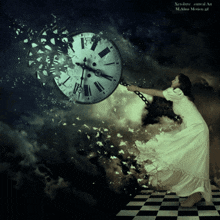Well, so. I guess I'm OK, but in less than a week I have to have major surgery, and it has thrown me just a teeny tiny bit. Talk about having your world turned upside-down and shaken like an existential Etch-a-Sketch (oh, what a lovely phrase!) Or am I panning for gold? More like panning for deposits in the cat's litterbox.
Today I put up a 2025 calendar and realized it was one of those free ones from a charity, the Canadian Cancer Society. It gave me pause - is this lucky, unlucky, tempting the gods, etc.? Then I decided, hell, it was free and I hate buying calendars, and besides, this is an outfit geared towards ever-more-effective treatments. I hope. So it went up.
Yesterday was a misadventure, but it turned out OK after all. I have had to scribble down a ton of information due to surprise phone calls, extremely important dates, times and locations for the huge number of tests and preps I need to keep track of before I get mutilated forever. They only go over it once, fast, and you'd better be ready for it with a pen and paper, right now, because you have one shot at it, and as usual there is no way to confirm it afterwards. Not that it's stressful or anything.
One of the most bizarre ones came on Christmas Day, during one of those ultra-rare times when I have my whole family together. Christmas Day. Right! So I scribbled the info down on a sticky note (which is how I organize my world, forget about phones, I hardly ever use one) and stuck it on my calendar. They told me I had to have a CT scan on New Years Eve, which is about as festive as my holiday season got this year.
Yesterday was the day we were supposed to go to (I thought) Eagle Ridge hospital (a 15-minute drive) for the CT scan, and when we got there we were told we had the wrong hospital, it was at Royal Columbian in New Westminster (a horrible old hospital attached to the worst memories of my life, which I can't even go into here because it made facing possibly terminal cancer look like a bloody day at the beach). The receptionist kindly rebooked me for 45 minutes later, and we got there just in time. It being New Years Eve, there was no waiting at all, and the procedure was incredibly fast, so it all worked out after all, but I did NOT need the stress it caused. As it turned out, I did have the information from Christmas Day written down correctly, but was so confused by all the other stuff crowding in on me that I just got it wrong.
Tomorrow is a horrendous day, with all sorts of stuff I have to do, end-to-end for the entire day, cardio, blood tests, other things too bizarre and intimidating to even mention, with no appointments or requisitions or anything, and it's damn hard to get straight information out of anyone. They always start screaming at me to "calm down, calm down!!" It's OK for THEM to be agitated, of course (because they hold all the power and I am just a peon), but never me, oh no, never me. What have I got to be upset about? Aren't I grateful for all this excellent care? What is wrong with me?
I loathe dealing with the medical system at the best of times, and this is NOT the best of times, in fact, it might turn out to be the worst outcome I can think of. I hope not, and I do try to focus on things I want to do after my recovery (particularly, just going out and doing my birdwatching again - it really doesn't take much to make me happy, but to have these few simple things withdrawn from my life is truly miserable, and it's worse to think I may never be able to enjoy those simple pleasures again).
In truth, I have no idea what will happen. Part of me is convinced there's nothing wrong in there after all, and this has all been a big mistake. They'll gut me for no good reason, and I will be immobilized and in unrelenting pain for the rest of my life (with no relief whatsoever, of course! And asking for pain meds automatically makes you an addict trying to cadge drugs for your own partying purposes, or just a thief, and, in any case, obviously weak. Pull your socks up, dear, and stop complaining, NOW.)
My reaction to all this has shocked me somewhat due to all the anger I feel, about so many things. And of course it's bad mojo to say all this, or even think it or consider it, at the start of a fresh new year, unspoiled by catastrophe (so far - it's only 11:30 a.m.). But I do remember being all pleased at the start of 2020, such a symmetrical, lovely-looking date for someone who used to pay some attention to things like numerology (which, thank God, I outgrew years ago, along with palmistry, astrology and Christianity, the worst con of all). And look how THAT turned out.
And of course, all those Nostradamus types are now insisting they KNEW 2020 would be a hellish year, in spite of initially painting it as God's gift to mankind and the luckiest year in human history.
I can't say, but I have to say, and this is my blog so I WILL say, but really, no one is reading it anyway or has any interest whatsoever. I write this because I need to write it. I keep seeing those last few grains of sand trickling through the hourglass. Can I turn it upside-down again? Well, isn't my life upside-down to begin with?





































